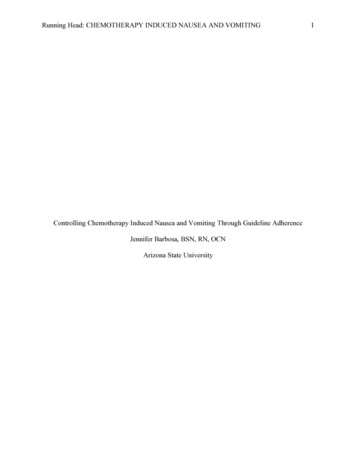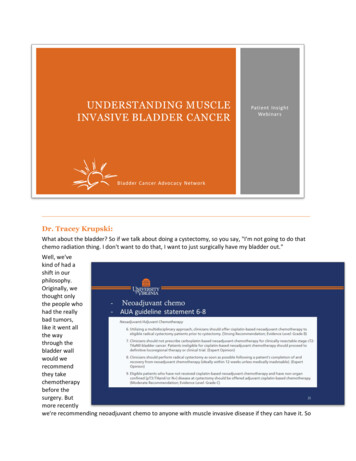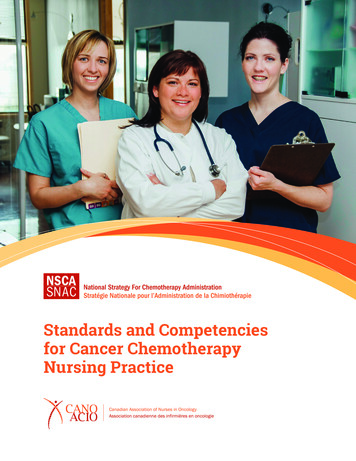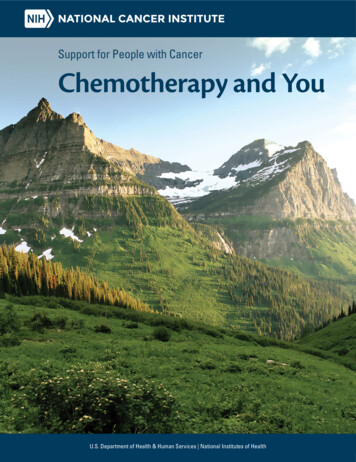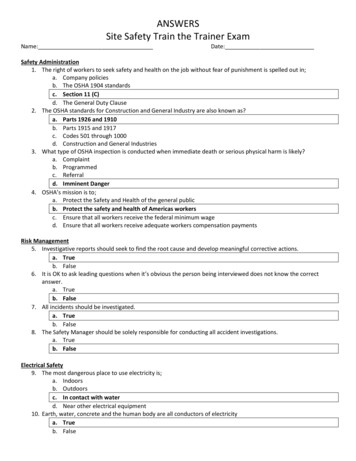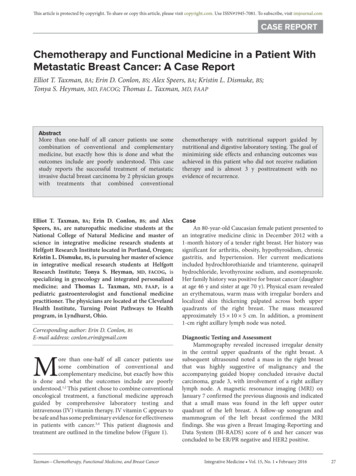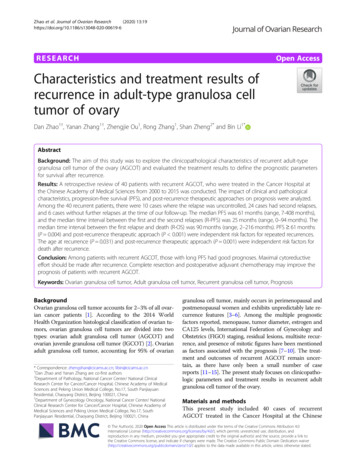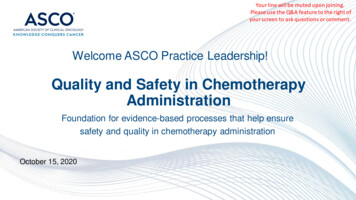
Transcription
Your line will be muted upon joining.Please use the Q&A feature to the right ofyour screen to ask questions or comment.Welcome ASCO Practice Leadership!Quality and Safety in ChemotherapyAdministrationFoundation for evidence-based processes that help ensuresafety and quality in chemotherapy administrationOctober 15, 2020
Quality and Safety inChemotherapy AdministrationRonda Bowman, MHA, RN, OCNDirector, Consulting and Value-based ProgramsVeronica Gorman, MBASenior Program Manager, Consulting Services
Quality and Safety in Chemotherapy Administration During COVID-19Pandemic Objectives: Review quality and safety standards in chemotherapy administration Describe healthcare facility recommended policies and procedures forchemotherapy administration Identify opportunities for standardization and consistency in patientcare delivery 2020 American Society of Clinical Oncology (ASCO). All Rights Reserved Worldwide.
Quality and Safety in Chemotherapy Administration During 200/JOP.2016.017905 2020 American Society of Clinical Oncology (ASCO). All Rights Reserved Worldwide.
Why are chemotherapy administration safety standards important?Provides standards and standardization in care. Standards to minimize the risk of errors inchemotherapy ordering, preparation, and administration, including both oral and parenteraltherapy. Errors happen. Betsy Lehman, an award-winning health journalist, died onDecember 3, 1994, after receiving an inappropriately high dose ofcyclophosphamide chemotherapy for breast cancer Errors happen. December 2015, a 49-year-old man died as a result of achemotherapy overdose, two decades after attention was first focused onchemotherapy administration safety initiatives2016 Updated American Society of Clinical Oncology/Oncology Nursing Society ChemotherapyAdministration Safety Standards, Including Standards for Pediatric 2016.017905 2020 American Society of Clinical Oncology (ASCO). All Rights Reserved Worldwide.
Why are chemotherapy administration safety standards important? Errors happen. In a survey, 63% of nurses who administer parenteralchemotherapy reported personal knowledge of medication errors Errors happen. As chemotherapy-related errors are intercepted at rates ofapproximately 2% to 5%, it is important to note that some types of errorsare virtually undiscoverable without continuous monitoring of thepreparation process2016 Updated American Society of Clinical Oncology/Oncology Nursing Society ChemotherapyAdministration Safety Standards, Including Standards for Pediatric 2016.017905 2020 American Society of Clinical Oncology (ASCO). All Rights Reserved Worldwide.
Why are chemotherapy administration safety standards important? Prescribing errors were more likely in patients who had more than three injectedchemotherapy drugs Prescribing errors were more likely in patients who had at least one dosemodification Prescribing errors were more likely in patients who protocols including carboplatin Inadvertent intrathecal chemotherapy administration is a rare but welldocumented phenomenon Prescribing errors related to oral chemotherapy regimens wrong or missed doses, wrong drug, and wrong number of days suppliedChemotherapy Medication Errors (The Lancet Oncology, April icle/PIIS1470-2045(18)300949/fulltext#: :text 20area%20of%20growing%20risk. 2020 American Society of Clinical Oncology (ASCO). All Rights Reserved Worldwide.
Why are chemotherapy administration safety standards important? Error types included: dose errors failure to acknowledge electronic alert errors involving medication choice, duplicate orders, or failure to validatean order that had been entered by a junior physician Risk factors for severe prescription errors included: occasional users of the electronic prescribing system junior physiciansChemotherapy Medication Errors (The Lancet Oncology, April icle/PIIS1470-2045(18)300949/fulltext#: :text 20area%20of%20growing%20risk. 2020 American Society of Clinical Oncology (ASCO). All Rights Reserved Worldwide.
Why are chemotherapy administration safety standards important? Patients with cancer may beCancer care is a complex, tightlycompromised by their disease andconnected system, in whichtreatment effecting their physiologicalreservesinterdependencies are inherent andfailures can have catastrophic results Many antineoplastic therapies are toxic,with narrow therapeutic indices Therapies might include novel agents orcombinations and require multiple doseadjustments and precise monitoring oflaboratory parametersChemotherapy Medication Errors (The Lancet Oncology, April icle/PIIS1470-2045(18)300949/fulltext#: :text 20area%20of%20growing%20risk. 2020 American Society of Clinical Oncology (ASCO). All Rights Reserved Worldwide. Care is delivered over weeks or monthsby interprofessional care teams thatmight work in different clinical settings—ascenario that increases the risk ofmiscommunication
ASCO/ONS Chemotherapy Administration Safety Standards 4 Domains Standards Standards elementsCreating a SafeEnvironment –Staffing andGeneral PolicyTreatmentPlanningPatientConsent andEducationOrderingPreparingDispensing andAdministeringChemotherapyMonitoring AfterChemotherapy isadministered,includingadherence,toxicity, andcomplications2016 Updated American Society of Clinical Oncology/Oncology Nursing Society Chemotherapy Administration Safety Standards,Including Standards for Pediatric 016.017905 2020 American Society of Clinical Oncology (ASCO). All Rights Reserved Worldwide.
ASCO/ONS Chemotherapy Administration Safety StandardsPatient CareDocumentationProcessPolicies andProceduresSafety Standards Requirements 2020 American Society of Clinical Oncology (ASCO). All Rights Reserved Worldwide.
ASCO/ONS Chemotherapy Administration Safety StandardsDomain 1: Creating a Safe Environment—Staffing and General PolicyBefore the first administration of a new chemotherapy regimen, chart documentationincludes at least the following eight elements: Pathologic confirmation orverification of initial diagnosis. Initial cancer stage or current cancerstatus. Complete medical history andphysical examination, includingpregnancy status, as applicable. Presence or absence of allergiesand history of hypersensitivityreactions. 2020 American Society of Clinical Oncology (ASCO). All Rights Reserved Worldwide. Assessment of the patient’s and/orcaregiver’s comprehension ofinformation regarding the diseaseand treatment plan. Initial psychosocial assessment,with action taken when indicated. The chemotherapy treatment plan,including, at a minimum, the patientdiagnosis, drugs, doses, duration oftreatment, and goals of therapy.
ASCO/ONS Chemotherapy Administration Safety StandardsDomain 1: Creating a Safe Environment—Staffing and General PolicyOn each clinical encounter or day of treatment, a patient assessment includes at least thefollowing eight elements documented and takes appropriate action: Functional status and/or performancestatus. Vital signs. Weight is measured at least weekly whenpresent in the health care setting. Height is measured at least weekly whenpresent in the health care setting and whenappropriate to the treatment population. Allergies and previous treatment-relatedreactions. 2020 American Society of Clinical Oncology (ASCO). All Rights Reserved Worldwide. Treatment toxicities. Pain assessment. Patient’s medications are updated atevery visit and reviewed by a practitionerwhen a change occurs. Assesses and documents psychosocialconcerns and need for support with eachcycle or more frequently as indicated, withaction taken when indicated.
ASCO/ONS Chemotherapy Administration Safety StandardsDomain 1: Creating a Safe Environment—Staffing and General Policy Provides information and financialresources and/or refers patients topsychosocial and other cancersupport services. 2020 American Society of Clinical Oncology (ASCO). All Rights Reserved Worldwide.
ASCO/ONS Chemotherapy Administration Safety StandardsDomain 2: Treatment Planning, Patient Consent, and Education Patients are provided with verbal and written or electronic informationas part of an education process before the first administration oftreatment of each treatment plan. The content of this educational materialwill be documented. Education includes family, caregivers, or others on the basis of thepatient’s ability to assume responsibility for managing therapy.Educational activities will be performed on the basis of the patient’slearning needs, abilities, preferences, and readiness to learn.https://www.cancer.net/ 2020 American Society of Clinical Oncology (ASCO). All Rights Reserved Worldwide.
ASCO/ONS Chemotherapy Administration Safety StandardsDomain 2: Treatment Planning, Patient Consent, and EducationPatient Education Verbal and Written Potential long-term and short Patient’s diagnosis.term adverse effects of therapy, Goals of treatment, that is, cureincluding infertility risks fordisease, prolong life, or reduceappropriate patients.symptoms. Symptoms or adverse effects Planned duration of treatment,that require the patient to contactschedule of treatmentthe health care setting or to seekadministration, drug names andimmediate attention.supportive medications, drugdrug and drug-food interactions, Symptoms or events that requireimmediate discontinuation of oraland plan for missed doses.or other self-administeredtreatments. 2020 American Society of Clinical Oncology (ASCO). All Rights Reserved Worldwide.
ASCO/ONS Chemotherapy Administration Safety StandardsDomain 2: Treatment Planning, Patient Consent, and EducationPatient Education Verbal and Written Procedures for handlingmedications in the home,including storage, safe handling,and management of unusedmedication. Procedures for handling bodysecretions and waste in thehome. 2020 American Society of Clinical Oncology (ASCO). All Rights Reserved Worldwide. Follow-up plans, includinglaboratory and provider visits. Contact information for thehealth care setting, withavailability and instructions onwhen and who to call. The missed appointmentpolicy of the health care settingand expectations forrescheduling or cancelling.
ASCO/ONS Chemotherapy Administration Safety StandardsDomain 3: Ordering, Preparing, Dispensing, and Administering ChemotherapyChemotherapy orders include at least the following elements: The patient’s name. A second patient identifier. The date the order is written. Regimen or protocol name and number. Cycle number and day, whenapplicable. 2020 American Society of Clinical Oncology (ASCO). All Rights Reserved Worldwide. All medications within the order set arelisted by using full generic names. Drug dose is written following standardsfor abbreviations, trailing zeros, andleading zeros. The dose calculation, including: The calculation methodology. The variables used to calculate thedose.
ASCO/ONS Chemotherapy Administration Safety StandardsDomain 3: Ordering, Preparing, Dispensing, and Administering ChemotherapyChemotherapy orders include at least the following elements: The frequency at which the variablesare re-evaluated. The changes in the values thatprompt confirmation of dosing. Date of administration. Route of administration. Allergies. Supportive care treatments that areappropriate for the regimen, includingpre-medications, hydration, growthfactors, and hypersensitivitymedications. 2020 American Society of Clinical Oncology (ASCO). All Rights Reserved Worldwide. Parameters that would requireholding or modifying the dose, forexample, laboratory values, diagnostictest results, and patient’s clinical status. Sequencing of drug administration,when applicable. Rate of drug administration, whenapplicable. An explanation of time limitation,such as the number of cycles for whichthe order is valid.
ASCO/ONS Chemotherapy Administration Safety StandardsDomain 3: Ordering, Preparing, Dispensing, and Administering ChemotherapyChemotherapy drugs are labeled immediately upon preparation, and labels include thefollowing 10 elements at a minimum: Patient’s name. A second patient identifier. Full generic drug name. Drug dose. Drug administration route. Total volume required to administer thedrug. Date the medication is to be administered. Expiration dates and/or times. A warning or precautionary label or sticker,as applicable, to storage and handling; maybe included within the label or on anauxiliary label. 2020 American Society of Clinical Oncology (ASCO). All Rights Reserved Worldwide. Sequencing of drug administration, whenapplicable, and total number of productsto be given when medication is providedin divided doses—each product should belabeled with the total number of products tobe administered and the individualproducts sequence within that totalgrouping, for example, one of five, two oftwo, etc.
ASCO/ONS Chemotherapy Administration Safety StandardsPatient CareDocumentationProcessPolicies andProceduresSafety Standards Requirements 2020 American Society of Clinical Oncology (ASCO). All Rights Reserved Worldwide.
ASCO/ONS Chemotherapy Administration Safety StandardsDomain 3: Ordering, Preparing, Dispensing, and Administering ChemotherapyA second person—a practitioner or other personnel approved by the healthcare setting to prepare or administer chemotherapy—performsthree independent verifications#1 verificationBefore preparation, a second person—a practitioner or other personnelapproved by the health care setting to prepare or administerchemotherapy—independently verifies: Two patient identifiers. Drug name. Drug dose. Route of administration. Rate of administration The calculation for dosing, including the variables used in thiscalculation. Treatment cycle and day of cycle. 2020 American Society of Clinical Oncology (ASCO). All Rights Reserved Worldwide.
ASCO/ONS Chemotherapy Administration Safety StandardsDomain 3: Ordering, Preparing, Dispensing, and Administering Chemotherapy#2 verificationUpon preparation, a second personapproved by the health care setting toprepare parenteral chemotherapy verifies: The drug vial(s). Concentration. Drug volume or weight. Diluent type and volume, when applicable. Administration fluid type, volume, andtubing. 2020 American Society of Clinical Oncology (ASCO). All Rights Reserved Worldwide.
ASCO/ONS Chemotherapy Administration Safety StandardsDomain 3: Ordering, Preparing, Dispensing, and Administering Chemotherapy#3 verificationBefore each chemotherapy administration, at leasttwo practitioners approved by the health care settingto administer or prepare chemotherapy verify anddocument the accuracy of the following elements: Drug name. Drug dose. Infusion volume or drug volume when prepared in asyringe. Rate of administration. Route of administration. Expiration dates and/or times. Appearance and physical integrity of the drugs. Rate set on infusion pump, when used. 2020 American Society of Clinical Oncology (ASCO). All Rights Reserved Worldwide.
ASCO/ONS Chemotherapy Administration Safety StandardsDomain 3: Ordering, Preparing, Dispensing, and Administering Chemotherapy#3 verification documentation Documentation of chemotherapyadministration confirms theverification of the eight elementsof standard and also includes thepatient’s clinical status during andupon completion of treatment. 2020 American Society of Clinical Oncology (ASCO). All Rights Reserved Worldwide.
ASCO/ONS Chemotherapy Administration Safety StandardsDomain 3: Ordering, Preparing, Dispensing, and Administering Chemotherapy At least two individuals, in thepresence of the patient, verify thepatient identification by using atleast two identifiers. Before initiation of eachchemotherapy administration cycle,the practitioner who is administeringthe chemotherapy confirms thetreatment with the patient,including, at a minimum, the nameof the drug, infusion time, route ofadministration, and infusion-relatedsymptoms to report—for example,but not limited to, hypersensitivitysymptoms or pain during infusion. 2020 American Society of Clinical Oncology (ASCO). All Rights Reserved Worldwide.
ASCO/ONS Chemotherapy Administration Safety StandardsDomain 4: Monitoring After Chemotherapy Is Administered, IncludingAdherence, Toxicity, and Complications Cumulative doses ofchemotherapy are trackedfor agents associated withcumulative toxicity. 2020 American Society of Clinical Oncology (ASCO). All Rights Reserved Worldwide.
ASCO/ONS Chemotherapy Administration Safety StandardsPatient CareDocumentationProcessPolicies andProceduresSafety Standards Requirements 2020 American Society of Clinical Oncology (ASCO). All Rights Reserved Worldwide.
Quality and Safety Standards Policies and Procedures2020 QOPI Certification Standards Manual Qualifications of clinical staff who order, prepare, and administer chemotherapy24/7 triage to a practitionerStandardized process for obtaining and documenting chemotherapy consent or assent.Intrathecal medication administrationExtravasation managementEmergent treatmentProcedure to assess patients’ ability to adhere to chemotherapy that is administered outside of the heathcare setting Assessment of each patient’s chemotherapy adherence at defined clinically meaningful intervals2020 QOPI Certification Standards t-qopi-certification 2020 American Society of Clinical Oncology (ASCO). All Rights Reserved Worldwide.
Quality and Safety Standards Policies and ProceduresAdditional policies from 2016 Chemotherapy Administration Safety Standards Follow-up for patients who miss or cancel scheduled visits and/or chemotherapytreatments Evaluation and documentation of treatment-related toxicities, dose modification related totoxicities2016 Updated American Society of Clinical Oncology/Oncology Nursing SocietyChemotherapy Administration Safety Standards, Including Standards for Pediatric 2016.017905 2020 American Society of Clinical Oncology (ASCO). All Rights Reserved Worldwide.
ASCO QOPI CertificationAbout QOPI Certification QOPI Certification Application Webinar QOPI Certification Standards and On-site Survey Webinar QOPI Certification Program boutqopi-certification 2020 American Society of Clinical Oncology (ASCO). All Rights Reserved Worldwide.
Resources 2016 Updated American Society of Clinical Oncology/Oncology Nursing Society Chemotherapy Administration SafetyStandards, Including Standards for Pediatric Oncology Journal of Oncology Practice, Dec. 2016 https://ascopubs.org/doi/10.1200/JOP.2016.017905 ASCO Cancer.net https://www.cancer.net/ Chemocare.com http://chemocare.com/ Chemotherapy Medication Errors (The Lancet Oncology, April 2018) PIIS1470-2045(18)300949/fulltext#: :text 20area%20of%20growing%20risk. Oncology Nursing Society https://www.ons.org/ Oncology Nursing Society Nursing Roles and Professional Practice https://www.ons.org/explore-resources?display topic&topic 916&ref RO Oral Chemotherapy Education Sheets https://www.ncoda.org/oce/ QOPI Certification/QOPI Certification Standards -certification 2020 American Society of Clinical Oncology (ASCO). All Rights Reserved Worldwide.
Questions? 2020 American Society of Clinical Oncology (ASCO). All Rights Reserved Worldwide.
Consulting ServicesClinical CareDeliveryAssessmentMedicalOncologyPatient EngagementAvailability &Access to CareChemotherapySafety (QCP)Clinical Palliative Care& End of LifeAdvancedPracticeProviderProgramOptimization 2020 American Society of Clinical Oncology (ASCO). All Rights Reserved MHTeambasedCareAnalyticalServices
Practice Operational AssessmentA comprehensive practice review Operational Assessment Tool Process EfficiencyooooPatient FlowPractice LayoutPatient EducationEffective use of technology Staffing Efficiencyo Staff Roles Financial Managemento Revenue Cycle Operationso Financial Toxicity, Financial Navigation Focus on measurement 2020 American Society of Clinical Oncology (ASCO). All Rights Reserved Worldwide.
Clinical Care Delivery Assessment Comprehensive review of clinical care services Medical oncology and radiation oncology Quality patient careSafe patient carePatient-centered carePatient navigationAccess to careTeam-based careContinual Improvement 2020 American Society of Clinical Oncology (ASCO). All Rights Reserved Worldwide.
Radiation Oncology Services Care Delivery AssessmentEnhanced AccessClinical ExpertiseQuality and SafetyTeam-Based CarePatient-Centered Care Quality Assessment Safe Environment Patient Consent and Education Ordering, Planning and AdministeringTreatment Monitoring after Treatment, IncludingToxicities and Complications 2020 American Society of Clinical Oncology (ASCO). All Rights Reserved Worldwide.
Additional Clinical Care Delivery Services Staff Education Training Programs (Medical Oncology)o Quality and safety in chemotherapy administration Advanced Practice Provider Programo Development and optimization of APP model Quality Recognitiono ASCO/ONS Chemotherapy Administration SafetyStandards readiness assessment/readiness supporto ACR and APEx accreditation readinessassessment/readiness supporto Oncology Medical Home recognition readiness 2020 American Society of Clinical Oncology (ASCO). All Rights Reserved Worldwide.
Staff Educational Training Programs(Medical Oncology) ASCO/ONS Chemotherapy Administration Safety Standards Oncology nursing resource Establish and Implement Chemotherapy administration policies and proceduresNurse orientation and training programsNursing role job descriptionsNursing role competency assessmentsInfusion nurse personal protective equipment policiesSpecific practice needs (e.g., COVID-19 response and care delivery,patient navigation, care coordination) 2020 American Society of Clinical Oncology (ASCO). All Rights Reserved Worldwide.
Advanced PracticeProvider ProgramAccess to Care, Team-based Care, and OverallSupport for Patient CareExploring Roles,Responsibilities, andCare ModelsCare Planning/ PatientEducationSpecialty Roles(e.g., survivorship,palliative care, geneticcounseling)Treatment & Followup VisitsHospitalized PatientSupportOral OncolyticManagementPatient FamilyCounselingSame DayUrgent VisitsAdvance CarePlanning 2020 American Society of Clinical Oncology (ASCO). All Rights Reserved Worldwide.
ASCO Consulting ServicesSummary Expertise in Oncology Comprehensive Evaluation ASCO and PracticeEngagement Report & Optimization PlanFor more information regarding ASCO Consulting Services, contact the programmanager at veronica.gorman@asco.org 2020 American Society of Clinical Oncology (ASCO). All Rights Reserved Worldwide.
Questions? 2020 American Society of Clinical Oncology (ASCO). All Rights Reserved Worldwide.
2020 Survey of Oncology Practice OperationsComprehensive reporting onstaffing, resources, productivity,expenses, and revenueOpen now through Friday, October16For more information, emailDavid.Harter@asco.org or visit:practice.asco.org PracticeSupport Practice Benchmarking
Upcoming Events Next Practice Leadership Call Thursday November 19 4:00pm EST Topic: Preparing For 2021o Previous speakers will return to review their previous presentations and helppractices prepare for the impact: Deactivate old codesAdd new codes and factorsTraining practice providersUpdating EMR systemso (Tentative) CMMI’s new Radiation Oncology (RO) Modelo Register at s
Practice Leadership CallsVisit:practice.asco.org
Betsy Lehman, an award-winning health journalist, died on December 3, 1994, after receiving an inappropriately high dose of cyclophosphamide chemotherapy for breast cancer Errors happen. December 2015, a 49-year-old man died as a result of a chemotherapy overdose, two decades after attention was first focused on
